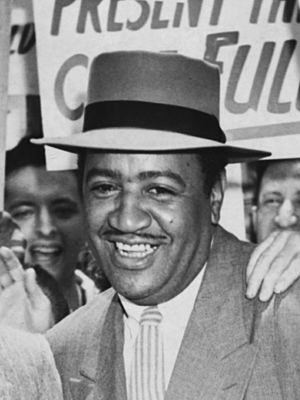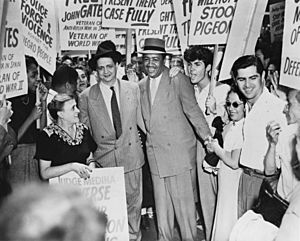Benjamin J. Davis Jr. facts for kids
Quick facts for kids
Ben Davis
|
|
|---|---|

Davis in 1949
|
|
| New York City Councilman | |
| In office March 1, 1943 – December 31, 1949 |
|
| Preceded by | Adam Clayton Powell |
| Personal details | |
| Born |
Benjamin Jefferson Davis, Jr.
September 8, 1903 Dawson, Georgia |
| Died | August 22, 1964 (aged 60) New York City |
| Nationality | American |
| Political party | Communist |
| Occupation | Lawyer, Activist, Politician |
| Known for | Smith Act trials of Communist Party leaders |
Benjamin Jefferson Davis Jr. (born September 8, 1903 – died August 22, 1964) was an important African-American lawyer and politician. He was also a member of the Communist Party. In 1943, he was elected to the New York City Council, representing the area of Harlem.
After World War II, Ben Davis faced more challenges from people outside Harlem. In 1949, he was one of many Communist leaders who were charged under a law called the Smith Act. He was found guilty and sent to prison for five years.
Early Life of Ben Davis
Benjamin J. Davis Jr. was born on September 8, 1903, in Dawson, Georgia. His friends called him "Ben." His parents were Benjamin Davis, Sr. and Jimmie W. Porter.
In 1909, his family moved to Atlanta. There, Ben's father, known as "Big Ben" Davis, started a weekly newspaper for black people called Atlanta Independent. The newspaper did very well. It helped the family live a comfortable middle-class life. Ben's father became a well-known black political leader. He even served on the Republican National Committee for the state of Georgia.
Young Ben Davis Jr. went to high school at Morehouse College in Atlanta. He then left the South to study at Amherst College, where he earned his first degree in 1925. Davis continued his studies at Harvard Law School, finishing in 1929. For a short time, Davis worked as a journalist. In 1932, he started his own law practice in Atlanta.
Ben Davis's Political Journey
Ben Davis became more involved in radical politics after a trial in 1933. He was the lawyer for Angelo Herndon, a 19-year-old black Communist. Herndon was charged with trying to start a rebellion because he was organizing a union for farm workers in Georgia.
During the trial, Davis faced angry and racist reactions from the judge and public. He was very impressed by Herndon's courage. After giving his final arguments, Davis decided to join the Communist Party himself. Herndon was found guilty and sentenced to many years in jail. However, he was later freed in 1937. This happened when the Supreme Court of the United States decided that Georgia's law against rebellion was against the U.S. Constitution.
In 1935, Davis moved to Harlem, New York. This was part of the Great Migration, when many black people moved from the South to northern cities. He became an editor for The Negro Liberator, a Communist Party newspaper for African Americans. Later, he became an editor for The Daily Worker, the Communist Party's main English newspaper.
In 1943, Ben Davis was elected to the New York City Council. He took the seat that Adam Clayton Powell Jr. left to run for Congress. Davis was re-elected in 1945 for a four-year term.
Davis lost his bid for re-election in 1949 for a few reasons. First, New York changed its voting system. Harlem was divided into three districts, which made the black vote less powerful. Second, Davis's opponent was a journalist named Earl Brown. Brown was supported by the Democratic, Republican, and Liberal parties.
Finally, in July 1948, Davis was charged with breaking the Smith Act. This was a law from World War II. The charge was about his connection to the Communist Party. He was tried with eleven other people for their Communist beliefs and party membership in the Smith Act trials. Paul Robeson, a famous actor, singer, and civil rights activist, spoke out in support of Davis and the others. Davis was found guilty on October 13, just a few weeks before the election.
With only a month left in his term, Davis was removed from the city council. This was required by state law. His former colleagues even passed a resolution celebrating his removal. He tried to appeal his conviction for two years, even going to the Supreme Court of the United States, but he was not successful.
On March 1, 1955, after serving three years and four months in a federal prison, Davis was freed. However, he was immediately sent to another jail for 60 more days. This was for refusing to answer questions in another trial where he was a witness. In 1957, the Supreme Court looked at the Smith Act again. They ruled that the First Amendment protects strong and different opinions, unless they create a "clear and present danger."
In the years that followed, Davis traveled to many college campuses to give speeches. He stayed active in politics. He worked to promote civil rights and economic fairness for everyone. In 1962, Davis spoke at schools like Harvard, Columbia, Amherst, Oberlin, and the University of Minnesota. However, City College of New York, which was in the district he used to represent, did not allow him to speak on campus at first. After students protested, Davis was allowed to speak outside on the street. He continued to publicly support the actions of the Soviet Union.
In 1962, Davis was charged with breaking another law, the McCarran Internal Security Act. He died shortly before this case went to trial.
Death
Ben Davis died from lung cancer in New York City on August 22, 1964. He was almost 61 years old. At the time of his death, he was running for a seat in the New York State Senate.
Legacy
While he was in prison, Ben Davis wrote notes for a book about his life. Prison officials took these notes and did not release them until after his death. The book was published in 1969. It was called Communist Councilman From Harlem. His friend and fellow defendant, Henry Winston, wrote the introduction.
Works
- "Must Negro Americans Wait?"
- "The Negro People in the Struggle for Peace and Freedom."
- "Upsurge in the South."
- "The Path of Negro Liberation."
- "Why I Am A Communist."
- "Ben Davis on the McCarran Act."
See also
- Smith Act trials of Communist Party leaders
- CPUSA
- Henry Winston
- J. Raymond Jones
- David Paterson
 | Emma Amos |
 | Edward Mitchell Bannister |
 | Larry D. Alexander |
 | Ernie Barnes |


